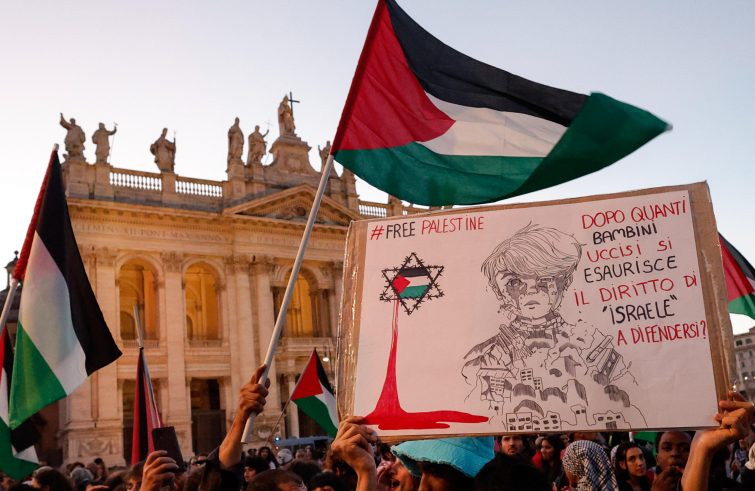
Dramatic footage has emerged depicting a mob storming a flight from Israel in the capital of Dagestan; in a statement, the President of the Union of Jewish Communities in Italy denounced “the escalating climate of intolerance” across the country. The outbreak of conflict in the Middle East on 7 October has had a powerful impact in Europe, blurring the boundaries of dialogue, creating a widespread climate of hatred and violence, reminiscent of September 11, 2001. “Unfortunately”, says Brunetto Salvarani, “anti-Semitism is history’s oldest and most enduring prejudice or hatred, whose origins span hundreds of years. It culminated in the Shoah and it resurfaces especially in times of crisis.” Brunetto Salvarani is a theologian, expert in dialogue and religious pluralism, president of the Italian organisation ‘Friends of Neve Shalom and Wahaat as Salam’ a village in Israel where Jews and Palestinians, all Israeli citizens, live together in justice and peace.
There is a growing climate of hatred in Italy too.
We must never forget that Italian Jews are a very small minority, with around 30,000 registered members of Jewish communities nationwide. Ironically, this is a situation that theoretically affects a very small number of Italians. Nevertheless, the “Jewish question”, as it has been called, remains a cause for concern. Today it faces the explosive situation in Israel and Palestine. Anti-Semitism always thrives on a permanently unresolved crisis and, let us not forget, it taps into deeply ignorant soil, so that ordinary Italian citizens find it difficult to understand the underlying historical dynamics that have led to a situation that was not created overnight, especially in that land, which has such a strong memory of the past, and, by the same token, here too.
How are Jewish communities defined in Italy?
Italian Judaism has historically been integrated into the history of our nation. It has also been a very liberal form of Judaism.
My thoughts go to enlightened figures like Rabbi Elio Toaff, the historic Chief Rabbi of the Jewish community of Rome, and Amos Luzzatto, who was for a long time President of the Union of Jewish Communities in Italy.
These figures were very much part of Italian life and society and were aware of the important role that the small Jewish minority played in the dynamics of a country that was becoming increasingly multi-religious and multicultural.
In today’s atmosphere, what are the mistakes that religious communities in Italy should avoid at all costs?
The first mistake that should be avoided is to dismiss the experience of dialogue, which has taken root even in our country in recent years. Interreligious dialogue is necessary. In fact, it is even more necessary today.
The other mistake to be avoided is to succumb to the temptations of fundamentalism and to take sides between the opposing camps.
In the end, taking sides does not lead to the desired result. What is needed today is a space for critical reflection on current events, but with a view to peace education and dialogue. Above all, there is a need for someone who can show what happens when the paths of hatred and violence are chosen.
The conflict that broke out on 7 October unfortunately seems to have reached a point of no return. What has been its impact on the interfaith dialogue between religious communities?
Indeed, at the moment, the collateral consequences of the events of October 7 suggest a resumption of the logic of the clash of civilisations. This can be seen both in the media and in the collective imagination.
It’s a paradigm that we thought had been discarded, not least owing to Pope Francis so resolutely opposing it. Instead, it took only a few days to plunge us back into a climate of war, including a climate of religious conflict. After September 11 and the invasion of ISIS, strenuous processes of inter-religious dialogue were set in motion. Processes of virtuous integration began, even in our country.
Will these processes continue in these situations of conflict or will they come to an abrupt halt?
The question is, will we once again fall victim to a blindness that prevents discernment? For those committed in advancing dialogue, the perspective that has been motivating us during these past weeks is the awareness of the progress made, which should not be discarded, but rather enhanced. The risk is to be dazzled by the burning tree without seeing the growing forest. There are friendly relations. Over the years we built a relationship of mutual esteem between members of different religious communities, which is moving forward.
My appeal goes out to young people in particular, to those who have unfortunately grown up in this media bubble that leads them to believe that everything is negative. Let us not succumb to the logic whereby religions are seen only as bearers of fundamentalism and closure.
And let us not forget that, as I said, religions have been, especially in the most difficult moments of recent history, and can, indeed must, become today a space for critical reflection and mutual listening.












